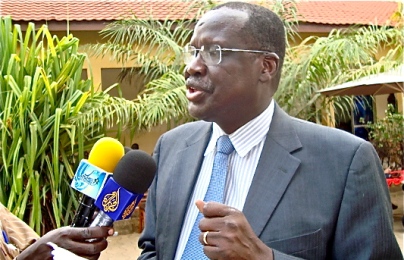S. Sudan blames global community for failure to resolve differences with Sudan
January 27, 2013 (JUBA) – South Sudan on Sunday expressed deep disappointment over the ongoing deadlock with its neighbor Sudan, blaming the international community for failing to resolve differences with the Sudanese government.

Jok added there was also little courage from the international community to take “bold decision[s]” over the failure to respect and honour agreements which the two governments signed to end their long-running disputes.
“As the [South Sudanese] government, we have done everything possible to end this conflict but the problem has always been on the other side,” Jok said on Sunday.
“The government of Sudan has never shown interest in resolving differences through peaceful dialogue and the international community shows little courage to take bold decision[s] to ensure the peace agreements are implemented”, he added.
South Sudanese President Salva Kiir and his Sudanese counterpart Omer Al-Bashir were summoned to high-level bilateral talks earlier this week at the AU ahead of an African Union Peace and Security Council (AUPSC) meeting in Addis Ababa, Ethiopia to discuss the implementation of agreements they both signed last September.
This follows their failure to resolve ongoing disputes over border regions, rebel groups, oil exportation and the status of contested areas, as well as Abyei’s final status.
Jok said Sudan was taking advantage of the reluctance of the international community to live up to its moral obligations. He made the remarks in an interview with Sudan Tribune on Sunday, during which he called on African leaders to mobilise support for his country in order to resolve outstanding differences with Sudan.
While expressing his country’s gratitude to the African Union (AU), regional bodies and the UN for their support during mediation efforts, “that were exerted to help us resolve through peaceful dialogue outstanding issues with Sudan”, Jok said stronger action was needed to end the cycle of conflict.
“This support should not end with [the] signing of the agreement. They should also extend them to implementation”, Jok told Sudan Tribune.
He said ongoing efforts must continue to focus on supporting peace and development in the continent, which would in turn bring stability and tangible results for member states and their endeavours.
Khartoum has also refused to allow the South to export its oil through Sudanese territory until it severs ties with the Sudan People’s Liberation Movement-North (SPLM-N) rebel fighters, active in the Sudanese border states of South Kordofan and Blue Nile.
South Sudan denies it is providing support to its former allies, accusing its neighbour of stalling negotiations by reneging on earlier agreements and making unfair demands.
Speaking at the AUPSC meeting on Sunday, Kiir called on African leaders to “shift from rhetoric to action” and decide on a binding framework to end ongoing conflicts between the two neighbours, stressing that endless discussions with Khartoum would yield few results.
This year’s AU summit is focused on addressing crises and conflict situations across the continent, including Sudan and South Sudan.
(ST)
